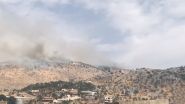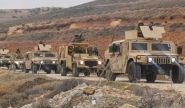
I write these words while Lebanon is hurting. Wiped out by relentless missiles, where hundreds of lives have been lost, a hurricane of devastation have left no brick unscathed, and people migrating towards the unknown.
By a razor thin margin with danger, journalists are covering the war in Lebanon. Their courage cannot be summed up in words. Days on nights of reporting to deliver the story, convey the message and the image, and echo the voices.
A wholehearted tribute to fellow journalists, some of whom share their stories and personal testimonies from times of war. In an enflamed country, left breathless in the face of merciless aggression, recently targeted to silence them, their duty and calling remain.
“You witness events unfold before you, the suffering is doubled”
"Everything affects you during live coverage," Bassam Abou Zeid, colleague and prominent journalist at LBCI told This is Beirut. "You witness events unfolding before you, you are in the middle of it all, and have to deliver the news. The suffering is doubled."
According to Abou Zeid the major challenges facing journalists in Lebanon today, both on the ground and in the studio is choosing the right words when reporting, noting that using certain terms could lead to” accusations of treason or being labeled as agents”. He also stressed the need to consider the emotions of people on the ground, who may react aggressively toward journalists, sometimes viewing them as spies. "No one protects or defends journalists in these situations," he added, "and those caught up are left to fend for themselves."
He shared the deep impact of watching Lebanon being destroyed and its people dying, while officials offer only empty words and broken promises. "You feel an inner struggle, questioning, 'Why are we still in Lebanon? We should leave.' I go through this often now. There's no future, no responsible government, no capable leaders doing what needs to be done," he added.
Abou Zeid noted that while citizens can now share videos, images, and audio through social media, verifying their accuracy is crucial. "In 2006, war coverage was much harder, but today it's different with proper verification. People post everything they see—bodies, victims, blood, and remains," he added.
Challenge in delivering the sensitive news
Sobhi Kablawi, the senior reporter at the local TV channel MTV, talked about the challenge of maintaining impartiality when delivering any information, especially on a widely viewed TV platform and making a difference in the country.
Another challenge is dealing with the influx of fake news and people claiming to be journalists. “The difficulty lies in reporting quickly amidst the fast-paced news cycle, but the real challenge is to be the fastest while remaining credible,” he said.
He also relayed the fear of Journalists being targeted in the field by the Israelis, or because of the diversity of opinions in the country.
Kablawi shared the two incidents that have affected him the most during the coverage of this war. The first one being in the early days of the war, after the assassination of senior commanders of Hezbollah’s Radwan unit.
“I was likely the first to receive the news in Lebanon and asked management if I should report it. They advised against it, as we don’t rush to announce deaths. Later, a voice note from the son of one of the commanders, unaware of his father’s death, circulated on a group chat. It was deeply moving, especially since the news had already spread on WhatsApp without him knowing,” Kablawi said.
The second incident was the day of Hassan Nasrallah's assasination. “When the news came in while I was live on air, I couldn’t say his name given his prominent status in the region, so I referred to him as a “very significant figure within Hezbollah,” he added.
Kablawi explained that coverage has undoubtedly changed in this era, with both positives and negatives. The positives are that news reaches him instantly, even while on-air, alongside live footage from the incident. However, the downside is the volume of fake news shared, especially through WhatsApp.
“People have grown to resent the camera”
Hussein Baydoun, a photojournalist at Alaraby Aljadeed told us that “in the past, people would ask us to come and document what was happening to show the world”. But today, with technological advancements and social media, people have grown to resent the camera.
“This is one of the hardest challenges we deal with. When we go on the ground, people attack us, accusing us of being spies, as if we are the ones providing the data,” he added.
Another challenge for photographers is the heavy restrictions they face. “Today, we are not allowed to go to the places being bombed. We are prohibited from entering, required to get permits, and often have to wait a long time, only to film the day after,” Beydoun said.
“This is completely different from the 2006 July War. Even photographers who lived through the civil war say that this war is one of the hardest due to the on-ground challenges, as they are being threatened and attacked,” he added.
For Beydoun, filming Beirut being bombed for eight hours straight affected him a lot.
“I was capturing the strikes at night on Beirut’s southern suburbs from a high location around the date of the assassination of Nasrallah and it was incredibly difficult to watch Beirut being bombed and to see the displaced, who already had no money due to the financial crisis of 2019, being forced to flee. This scene was deeply painful, as was the discrimination in the treatment of displaced people, which highlighted the inhumanity of the situation,” he said.
“The absurdity of war”
For Tilda Abou Rizk, our colleague and prominent Editor in Chief, the biggest challenge is journalists' safety. “Reporters are exposed to danger, and their reports may not make it through. During wartime, one’s alertness must be multiplied tenfold, with heightened instincts and journalistic reflexes on constant alert. To keep reporters safe, management ensures coverage is handled differently, often avoiding sending journalists on the ground and instead focusing on topics that highlight the consequences of events,” she said.
She highlighted that “we can also rely on international media that have people in target areas, providing updates, as was done during the 1975 war. Today, social media plays a significant role, with people on the ground sharing images and information. However, the crucial challenge is distinguishing the truth from rumors and manipulation. Social media is a double-edged sword: it can pressure by exposing the horror of events or be unreliable.”
“At the start of the war on Beirut's southern suburbs, the tragic death of many civilians, including a young girl, Naya Ghazi impacted me a lot,” Abou Rizk said. “A video of her at the barber, laughing wholeheartedly, circulated widely—she became a symbol of joy and, for me, an emblem of Lebanon. If I were to symbolize Lebanon, it would be through this little girl, full of life, taken in a war she had nothing to do with, highlighting once again the absurdity of war,” she added.
On innocent civilians being killed in an instant, Abou Rizk recalled the 1996 Qana massacre which left a deep impact on her as she covered the funerals, witnessing over 100 white coffins of unarmed civilians, women, and children, and the grief and anger around her. Writing about it required objectivity, yet the brutal targeting of civilians left a mark in her report. “This shows the absurdity and horror of war where lives are lost in an instant, for nothing,” she said.




Comments